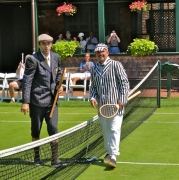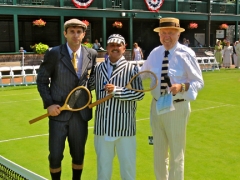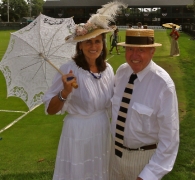RE-ENACTMENT OF FIRST US CHAMPIONSHIP (original) (raw)
Exact court where first championships played
NEWPORT, Rhode Island — They threw a “You are there!” birthday bash on the grounds of the Grand Old Lady of Bellevue Avenue the other day at the Hall of Fame. She, of course, being the Newport Casino, sturdy of timbers and rich in history, justifyingly proud of her role as the elder housemother of the global frolic called tennis.
But…Wimbledon…what about…?
Oh, yes, we all know that Wimbledon is the game’s grand-daddy, dating to 1877. However, the Big W moved and rebuilt in 1922. That left the Casino as not only the world’s longest-standing tournament site but the sport’s Valhalla: the International Tennis Hall of Fame.
Assembled in 1880, carpeted in smooth, lush grass, the playpen is overseen by the clock tower, a timepeace that has never defeated the Old Lady.
Is it polite to ask her age? Doesn’t bother her a bit. The answer is 130, and that figure is the reason for the birthday party.
William Glynn and Richard Sears impersonators
Where are you as a guest? Seated in a folding chair beside the original championship court, watching two young men playing for the singles title of the United States. The program says Sept. 3, 1881, and there you are, witnessing the final round of the inaugural U.S. Championship which had begun on August 31. Some day much later, somebody — maybe named Federer or Djokovic or Nadal — will capture the U.S. title in, say, 2011, and celebrate the competition’s 130th birthday.
Yes, the Championship had lost its status on fleeing from Newport to Forest Hills in 1917 — but not its charm. You can’t beat the Casino for intimacy and panache. So, if 1881 won’t be duplicated, we can still snatch a few timeless hours to soak up the atmosphere and explore the fascinating Museum, partner to the Hall of Fame.
Doubtless the present location and thousands of tennis addicts smooshing together is a carnival at Flushing Meadows where the U.S. Championships eventually became the U.S. Open, and fortunes were made in an afternoon.
But we can yet step into 1881 as the two adversaries — Sears and Glyn — joust for something new: to see who can sock the white balls more fiercely. A 19-year-old Harvard man does it better, protecting American honor from William Glyn, a Limey vacationing, in Newport, entering the tournament on a whim, 6-0, 6-3, 6-2. In fact Dick Sears won the first seven Championships, and nobody heard from Glyn again. Maybe the first choker in the American game’s history?
Glynn, Sears and Collins
They looked splendid in period attire: white flannel trousers for Sears, a black and white-striped jacket, tie and cap, the colors of his club, Longwood in Boston. Dark wool suit, jacket, tie, and cap for Glynn.
Their games were quite respectable: teaching pros Brett Marshall as the triumphant Sears, and Jake Worseldine as Glyn.
Every aspect of the afternoon was authentic, the original court, the white balls, the court tennis racquets as originally used in lawn tennis, the clothing, the score. Refreshments sold were pop corn, ice cream and lemonade.
And a most unexpected revelation: Classical music was played by a trio of string musicians throughout the match as had been the custom in the early days of tennis. Can you believe this? It was very mellow and inviting. Beethoven would have approved.
The Casino, now the last bastion of grass court tournaments in the U.S., hosts the ATP’s Campbell’s Hall of Fame Championships the week following Wimbledon. Along with the title is the Jimmy Van Alen Cup, saluting the mover and shaker who introduced the tie-breaker, no-ad scoring and numerous other imaginative improvements.
Anita and Bud at the Championships
1881 was a lively year, when the West was really wild. Billy the Kid was roaming lethally, and the Shootout at the OK Corral made a lot of deadly noise. But the Shootout at the Newport Casino just kept on going, in one form or another — and nobody got arrested.



